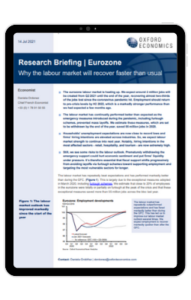Eurozone | Why the labour market will recover faster than usual

The eurozone labour market is heating up. We expect around 2 million jobs will be created from Q2 2021 until the end of the year, recovering almost two-thirds of the jobs lost since the coronavirus pandemic hit. Employment should return to pre-crisis levels by H2 2022, which is a markedly stronger performance than we had expected a few months ago.
What you will learn:
- The labour market has continually performed better than expected as the emergency measures introduced during the pandemic, including furlough schemes, prevented mass layoffs.
- Households’ unemployment expectations are now close to record lows and firms’ hiring intentions are elevated across industries. So, we expect labour market strength to continue into next year.
- We see some risks to the labour outlook. Prematurely withdrawing the emergency support could hurt economic sentiment and put firms’ liquidity under pressure.
Tags:
Related Services

Post
Nowcast shows wage growth slowing sharply
Our sentiment data, developed with Penta, suggests that UK private sector wage growth slowed sharply in March and early-April. If official data mirrors our sentiment indicator, it should keep the Monetary Policy Committee on track to cut interest rates in the summer.
Find Out More
Post
The euro and depreciation – shake, shake it off
Our new forecast assumes a slower euro appreciation against the dollar over the coming years than we previously anticipated. Relative productivity, terms of trade, and the current account will likely be less supportive of the euro than we thought. In addition, a stronger stock market than initially envisaged will attract more financial flows into the US than we had expected.
Find Out More